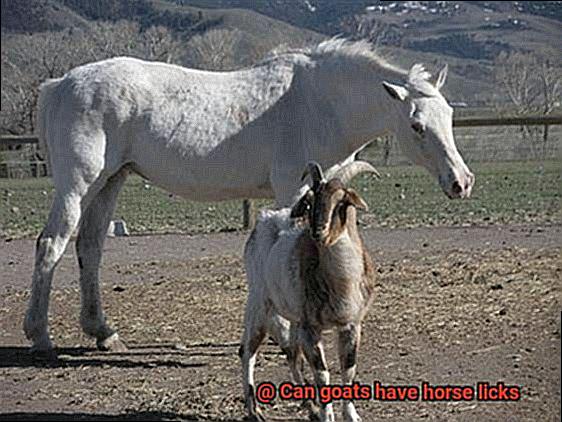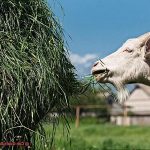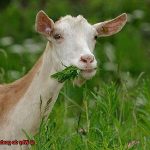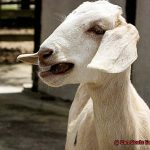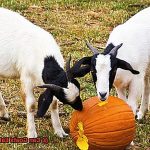Imagine a picturesque meadow with a herd of goats leisurely grazing when they stumble upon a horse lick. The goats’ curiosity gets the best of them, and they eagerly start slurping away at the salt and mineral mixture. But wait, can goats really have horse licks?
If you’re new to goat-raising, you might be unfamiliar with what a horse lick is. It’s essentially a salt and mineral block designed for horses to supplement their diet. Horses require specific amounts of salt and minerals to maintain their bodily functions. However, many people wonder if other animals like goats can reap the same benefits from these supplements.
The answer is yes; goats can have horse licks, but it’s crucial to know how much and when to offer them. Offering horse licks at the wrong time or in excessive amounts can lead to negative consequences for your goats such as dehydration or mineral imbalances.
In this blog post, we’ll dive into whether or not goats can have horse licks and discuss precautions you should take when offering these supplements to your furry friends. We’ll also explore which type of horse licks are appropriate for goats and how to monitor their salt and mineral intake accurately. So let’s get ready to party with some happy-goat vibes.
What are Horse Licks?
Contents
These brick-shaped salt blocks are specifically designed for horses to supplement their diet with essential minerals and nutrients. Not only are they easy to use, but they also come in various shapes and sizes to fit your horse’s needs.
Horse licks are packed with a range of minerals that are vital for maintaining a horse’s overall health. They contain calcium, phosphorus, magnesium, sodium, and potassium – each of which plays a crucial role in supporting various body functions like muscle contraction, nerve impulses, and bone development. Plus, horse licks help horses stay hydrated by providing them with essential electrolytes.
These blocks are incredibly convenient and can be placed in pastures or stalls where horses can access them easily. Horses will lick the block as needed to consume the minerals and nutrients they require. Horse licks are a great way to provide horses with essential minerals without having to add them to their feed.
While horse licks are primarily designed for horses, other animals may also enjoy them. Goats, for example, have been known to indulge in licking salt blocks if they are available. However, it’s important to note that horse licks may not provide all the minerals and nutrients that goats require. If you have goats, it’s recommended that you provide separate mineral supplements specifically designed for them.
When selecting a horse lick for your animal, it’s crucial to read the label carefully and choose one that is specifically designed for livestock or goats. Not all horse licks are created equally, and some brands may include additional additives or chemicals that could be harmful to your animal.
While it’s generally safe for goats to consume horse licks, it’s crucial not to rely solely on them for their mineral needs. Providing a well-balanced diet that includes hay, fresh water, and appropriate supplements is crucial for maintaining your animal’s health and wellbeing.
Can Goats Have Horse Licks?
However, with so many mineral blocks available on the market, it can be challenging to determine which one is right for your goats. One common question that arises is whether or not it’s safe to give your goats horse licks.
Horse licks are mineral blocks designed to provide horses with essential nutrients like salt, calcium, and magnesium. While these blocks may be beneficial for horses, they may not meet the unique nutritional needs of goats. Goats require specific nutrients in precise amounts to thrive, and horse licks may not provide an adequate balance.
Moreover, some horse licks may contain ingredients that are harmful to goats, such as copper. Although copper is an essential nutrient for goats, excessive amounts can be toxic. While not all horse licks contain copper, it’s crucial to scrutinize the ingredients list before giving them to your goats.
If you’re considering giving your goats a horse lick, it’s essential to consult with a veterinarian first. A vet can help you determine if a horse lick is appropriate for your goats and recommend a specific product that meets their nutritional needs.
In general, it’s best to stick with mineral blocks specifically formulated for goats. These blocks are tailored to meet their unique nutritional requirements and are less likely to contain harmful ingredients. By providing your goats with the right balance of nutrients, you can help ensure they remain healthy and happy.
Benefits of Horse Licks for Goats
One of the greatest benefits of horse licks for goats is improved health. Horse licks contain minerals like calcium, phosphorus, and magnesium that are crucial for proper digestion, bone development, and muscle function, promoting healthy skin and coat. Additionally, these minerals boost the immune system, ensuring that your goats remain healthy throughout their lives.
If you’re a goat owner who wants to boost milk production in their lactating goats, then horse licks are a great solution. The minerals present in these licks support lactation, allowing for greater milk production.
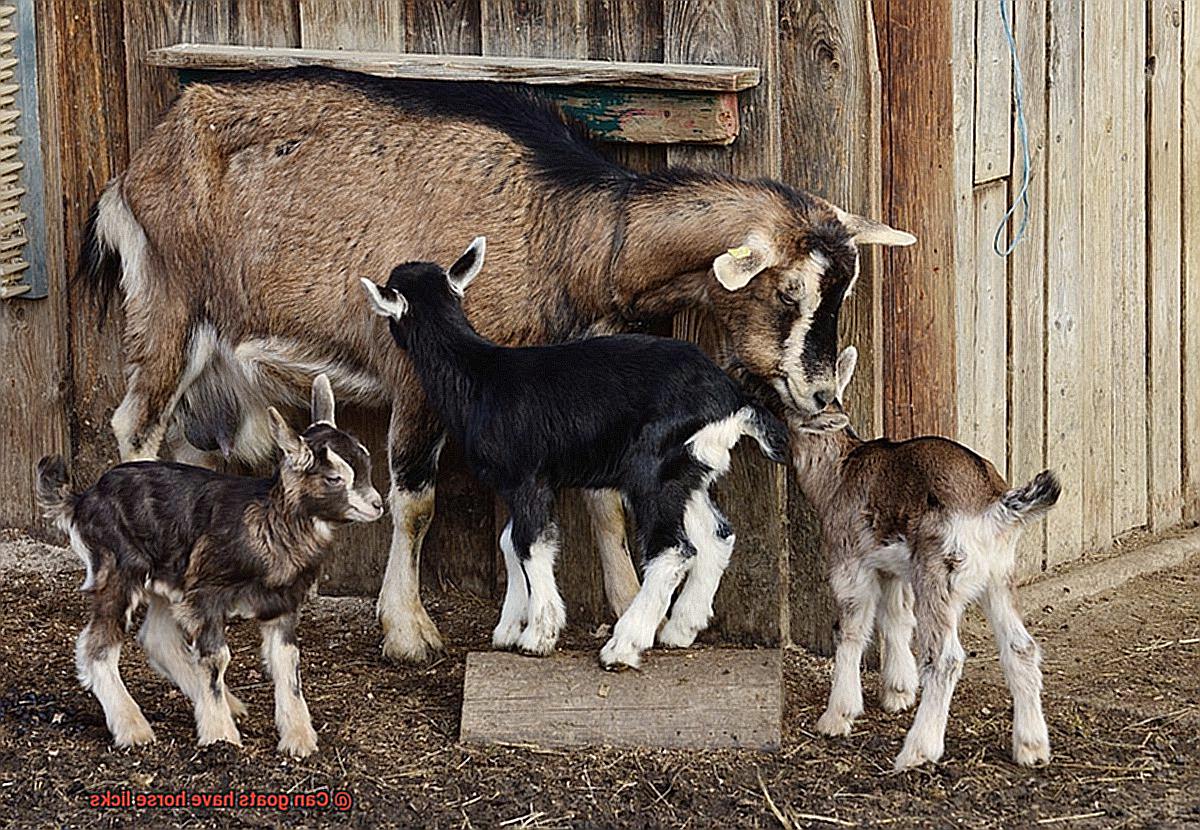
Grazing on pastures may not provide all the necessary minerals required for growth and development, leading to mineral deficiencies. By providing horse licks, you can prevent these deficiencies and ensure your goats receive all the necessary nutrients they need.
Did you know that goats love to lick things? By providing them with horse licks, you can satisfy this natural behavior and keep them entertained. This can help reduce stress and boredom while improving their overall well-being.
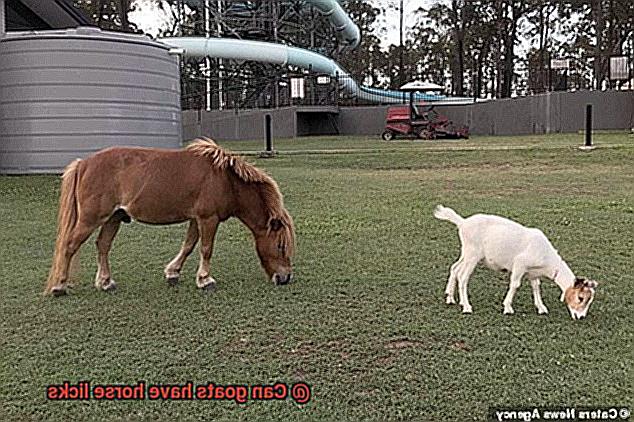
Compared to other supplements or mineral blocks available in the market, horse licks are relatively inexpensive and long-lasting. Goats tend to consume them slowly, making them a cost-effective solution for fulfilling their mineral needs.
However, it’s essential to ensure that the supplement you choose is specifically designed for goats and contains the right balance of minerals to meet their nutritional requirements.
Risks of Horse Licks for Goats
While horse licks may seem like a convenient and affordable way to supply your goats with essential minerals, they actually pose some serious risks that you should be aware of.
Firstly, horses and goats have different nutritional needs, and horse licks may not contain the nutrients that goats require. This can lead to imbalances in their diet, which can cause health problems over time. Instead, it’s best to provide your goats with a balanced diet specifically tailored to meet their nutritional needs.
Moreover, horse licks often contain high levels of molasses and sugar. Unfortunately, goats are more susceptible to developing urinary calculi or stones, and too much sugar intake increases their risk of this condition. Additionally, excessive sugar consumption can lead to obesity and other related health problems in goats.
Another significant risk of giving horse licks to goats is that they may consume too much salt. Although salt is an essential mineral for all animals, including goats, excess intake can cause dehydration, increased thirst, and even death in severe cases.
Lastly, horse licks may contain additives such as preservatives and artificial flavorings that can be harmful to goats. These chemicals may cause digestive upset or allergic reactions in your animals.
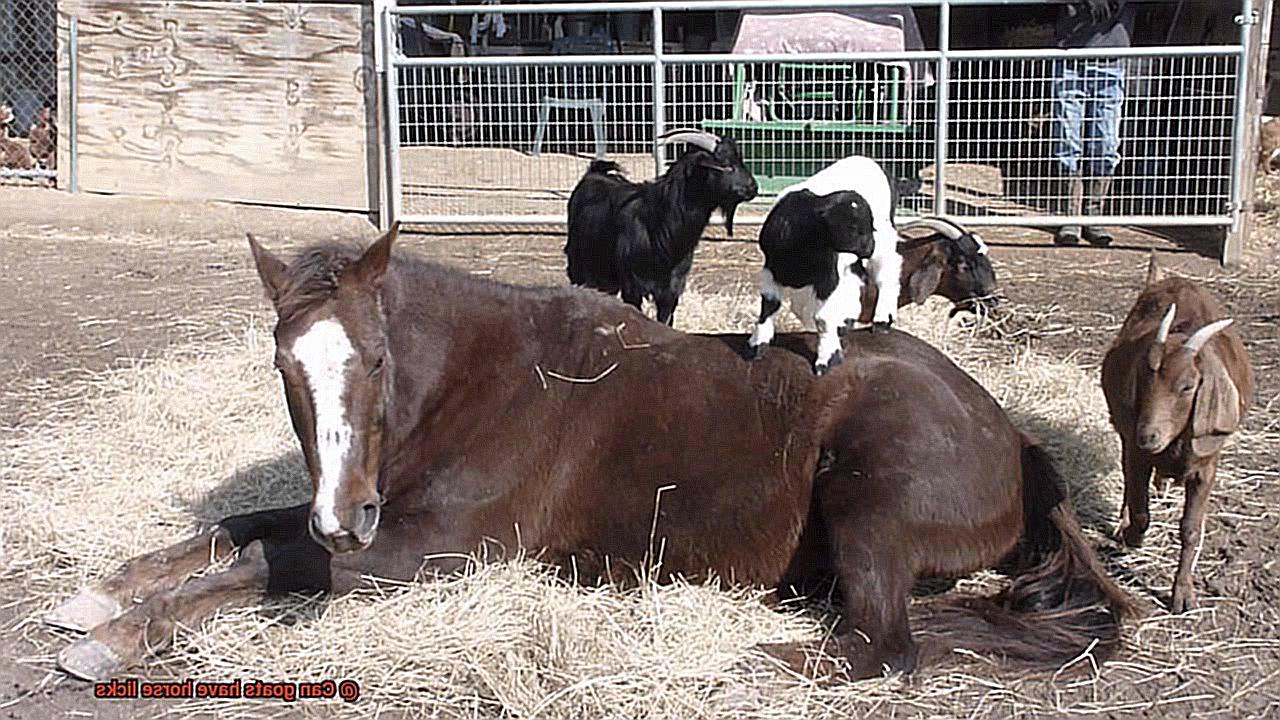
How to Choose the Right Horse Lick for Your Goat
It’s important to know how to choose the right one to ensure your goat’s health and well-being. Here are five factors to consider when selecting the perfect horse lick for your goat.
Look for a Goat-Specific Lick
First, choose a horse lick that is specifically designed for goats. While some horse licks may be safe for goats, it’s always best to stick with a product that is formulated with goats’ nutritional requirements in mind. This will ensure that your goat receives the right balance of minerals and nutrients.
Avoid Copper
Goats are very sensitive to copper, and too much of it can be toxic. Therefore, avoid licks that contain copper by checking the ingredients list before purchasing a horse lick.
Low Sugar Content
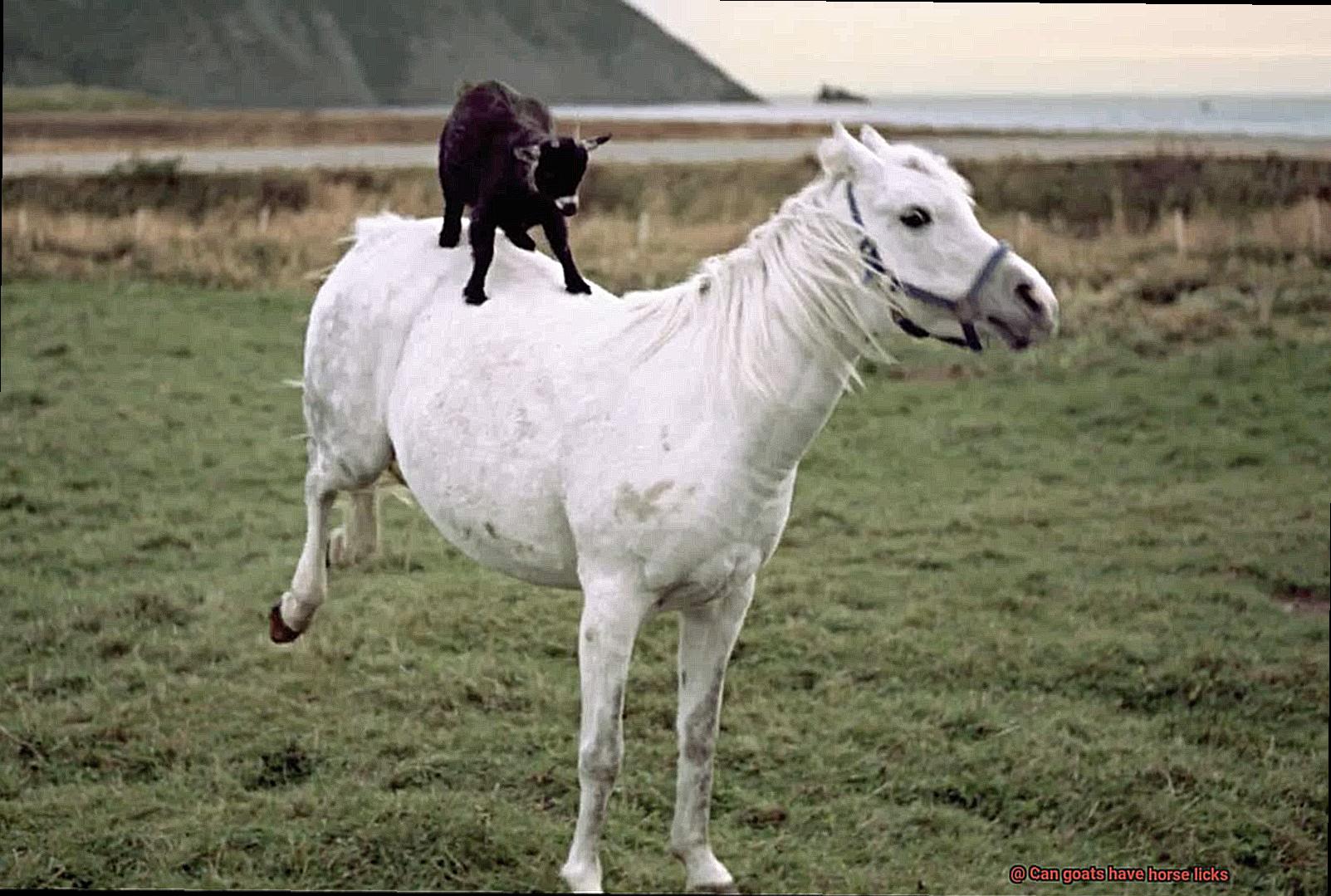
While goats do need some sugar in their diet, too much can lead to health problems like obesity and diabetes. So, choose a horse lick with a low sugar content to keep your goat healthy.
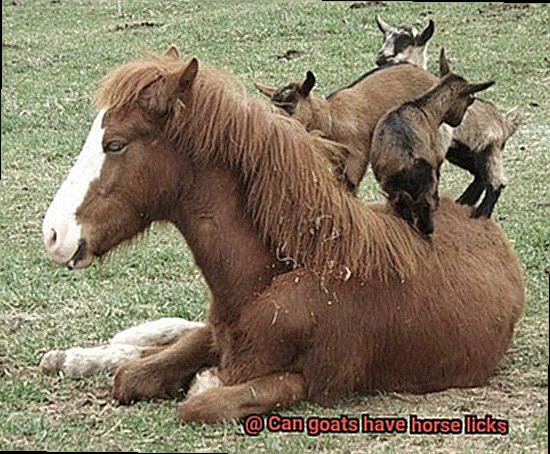
Consider the Size
Goats have smaller mouths than horses, so it’s important to choose a size that is appropriate for your goat. Look for a product that is small enough for your goat to handle but large enough to provide adequate nutrition.
Check the Mineral Content
Goats require different minerals than horses, so make sure the lick you choose contains the minerals your goat needs. For instance, if your goat is deficient in calcium or phosphorus, look for a lick that is high in these minerals.
By taking these factors into consideration, you can make an informed decision on the right horse lick for your goat. Additionally, it’s crucial to monitor your goat’s consumption of the lick and remove it if it becomes too small or if your goat begins to chew on the plastic holder.
Other Considerations When Feeding Goats Horse Licks
However, it’s important to consider all the potential hazards and risks when it comes to feeding them different treats. One such treat that may seem harmless is a horse lick, but there are some important considerations you should keep in mind.
High levels of salt in horse licks can be harmful to goats if consumed in excess. Goats have a lower tolerance for salt intake than horses do, so it’s crucial to monitor their intake and ensure they don’t overindulge. Too much salt can lead to dehydration and kidney damage, which can have serious consequences on their health.
In addition to salt, horse licks may also contain other potentially harmful ingredients such as molasses and minerals that may not be suitable or necessary for goats. As such, it’s essential to read the labels carefully and select a lick that is specifically formulated for goats if you choose to feed them one.
Another consideration when feeding goats horse licks is the risk of choking or blockages. Goats have a tendency to nibble on things, and large pieces of the lick could potentially break off and become lodged in their throat or digestive tract. This could lead to serious health issues and even death if not treated promptly.
To avoid these risks, it’s crucial to supervise your goats while they are consuming the lick and remove any small or broken pieces that could pose a choking hazard. If you do choose to feed your goats a horse lick, be sure to monitor their intake and select one that is specifically formulated for goats.
YssS1ToABAE” >
Conclusion
In summary, horse licks can be a fantastic addition to your goats’ diet, but it’s crucial to choose wisely and offer them in moderation at the right time. Goats have unique nutritional requirements that may not be entirely fulfilled by horse licks alone. Therefore, it’s vital to provide them with a balanced diet consisting of hay, fresh water, and appropriate supplements.
When selecting a horse lick for your goats, ensure that you pick one that is specifically designed for goats and contains the appropriate balance of minerals and nutrients. Avoid licks containing copper or excessive sugar levels as these can be detrimental to your goats’ health. Additionally, keep an eye on your goat’s intake of the lick and remove any small or broken pieces that could pose a choking hazard.
Overall, maintaining your goats’ overall health and well-being necessitates providing them with the proper nutrient balance. By supplementing their diet with horse licks in moderation while still giving them a balanced diet, you can guarantee they remain healthy and content.

